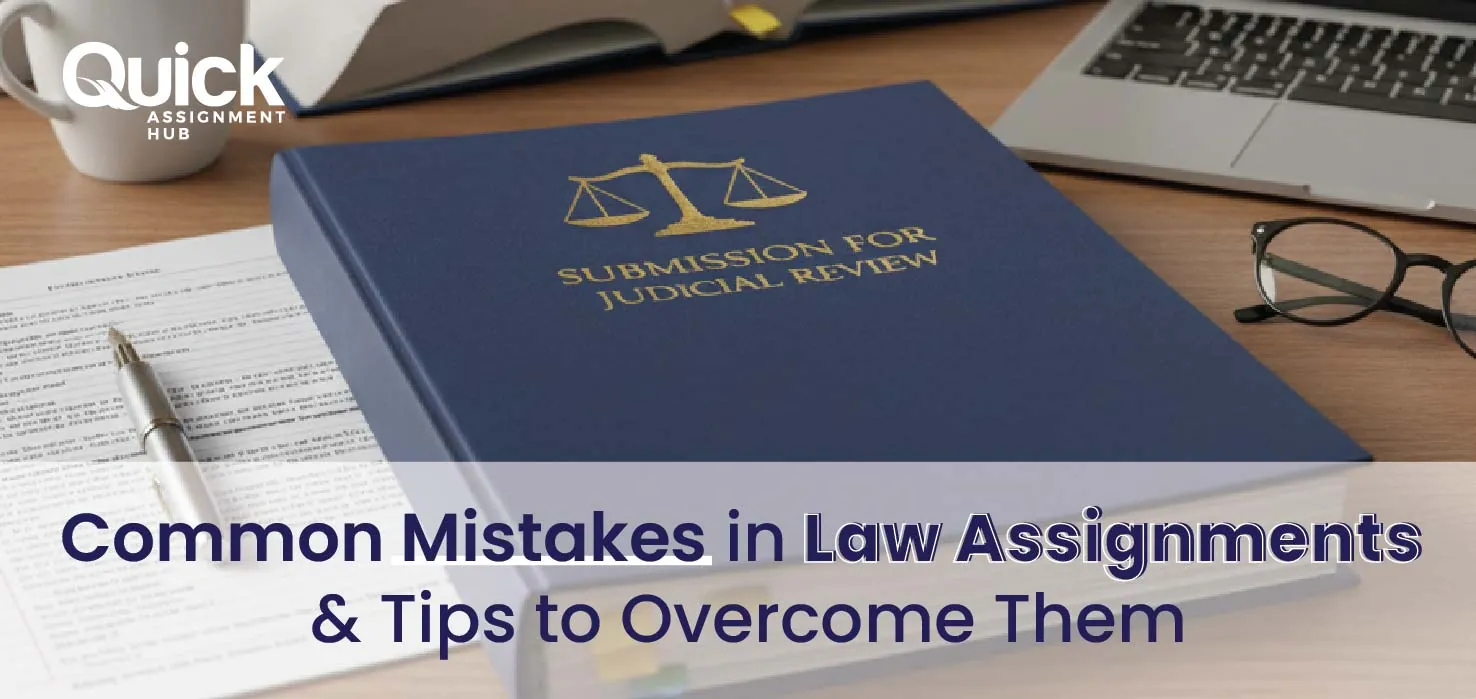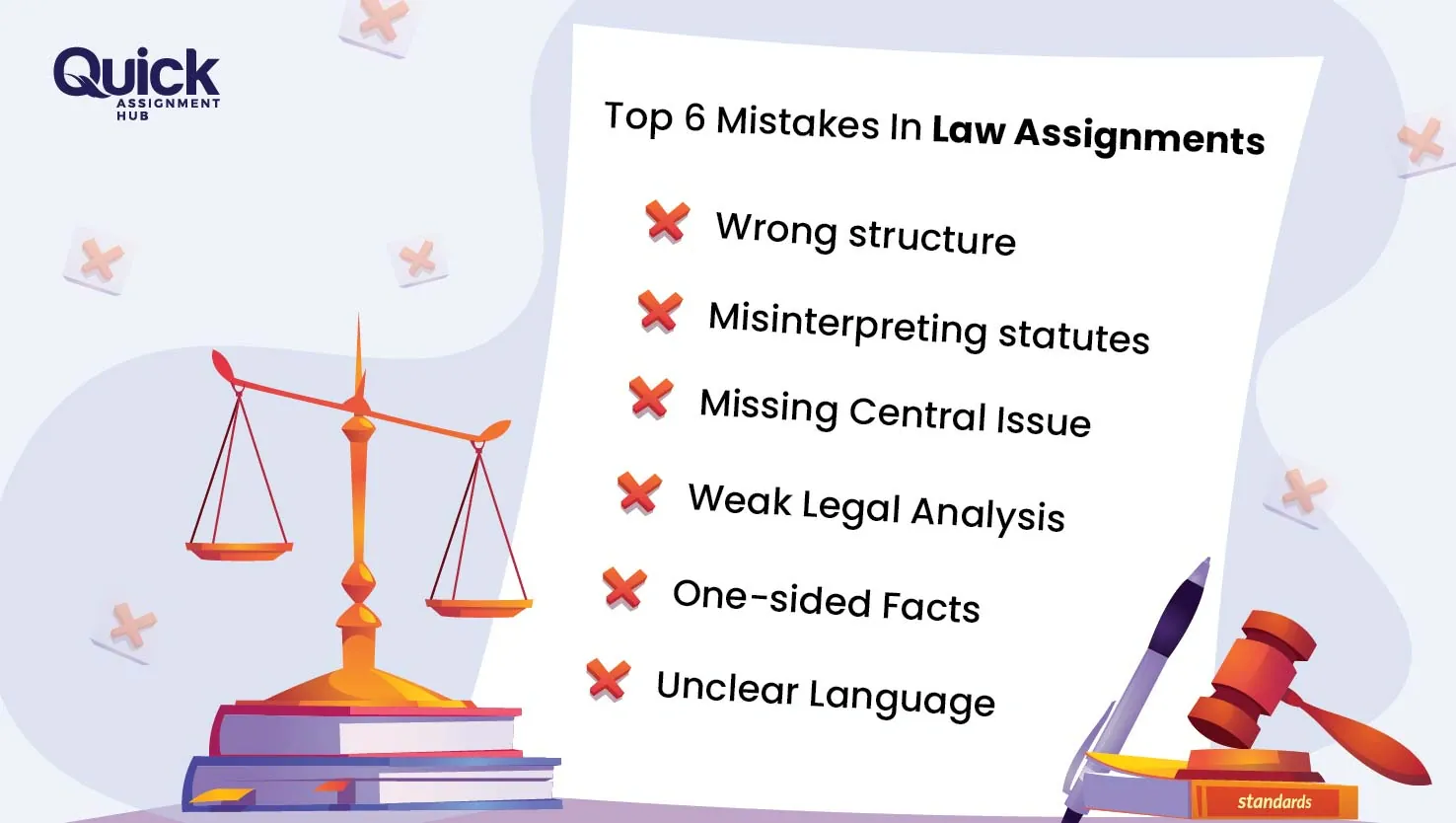
As a law student, your papers are not limited to composing assignments; they involve learning how to think, interpret, analyse case law, and write a structured argument. However, many students make the same mistakes in law assignments and fail to realise the source of loss of precious marks. The causes may include not understanding the question, failing to follow proper credit protocol, or merely hurrying through the research process, which can also hinder your overall performance.
To explain things better, in the following blog, we will discuss the most common pitfalls in law assignments and give you some tips for law assignment writing that can raise your grades. By the time you finish reading this blog, you will also discover how the professional law assignment help UK can assist you in perfecting the art of writing practical assignments.

Given below are some of the most common law assignment errors made by students:
One of the common errors in any given law assignment is a misunderstanding of the actual question being asked. Students jump into the writing without dismantling the keywords of the question. For example, a critical evaluation question requires you to provide a deeper analysis, not merely a description of the law.
Impact: You may add too much irrelevant information if you misunderstand the assignment question, leading to a loss of marks.
Law assignments should be logically presented. A proper structure is similar to the introduction, analysis, and conclusion. Without clear organisation, your assignment becomes hard to follow, and your arguments lack power.
Impact: Professors may not understand your points clearly, which may result in poor marks.
Arguments that lack strength or support are a big problem that recurs regularly. Often, students describe laws without applying them to the question, or they do not relate theory to the practice of real-life cases.
Impact: Your assignment may appear superficial instead of showcasing your critical thinking.
Legal terms can be complicated, and excessive use of legal jargon with a lack of explanation can be a typical mistake in law assignments.
Impact: This complicates your assignment unnecessarily and unintelligibly when you incorrectly abuse legal terms.
Procrastination will cause late or rather hurried submissions. You will miss your assignment by not allocating enough research, proofreading, and editing time.
Impact: This increases the chances of grammatical errors, forgetting to cite sources, or developing arguments.
Good legal writing requires much research. Learners like you often rely on one or two sources and frequently fail to access relevant law cases, statutes and scholarly articles.
Influence: The arguments that you bring out can be superficial and unconvincing.
The inability to properly cite sources is one of the most common law assignment errors that students commit. Law professors expect you to correctly use and cite references in OSCOLA, Harvard, or APA.
Impact: Citation problems can be considered academic fraud, and you will lose your grade.
You may write the best argument and still get defeated by your assignment's spelling, punctuation or grammatical errors.
Impact: It depicts laxness and the inferiority of your submission.
Identifying these mistakes can help with law assignments by avoiding them, so here are some tips for law assignments that you should consider:
Know The Requirements Of The Assignment: Read the question before writing something. Break it into subsections, indicate the preliminary research, and examine, analyse, discuss and explain any doubts to your professor.
Plan Your Assignment: The first step is to plan before writing. Plan the introduction, the key points, supporting details and conclusion. A plan will help you to stay organised.
Conduct Comprehensive and Accurate Research: Utilise as many materials as possible, such as textbooks, academic journals, law books and law databases. Do not trust ancient or rotten sources.
Cite Authoritative Resources: Credibility is an attribute of law. Your references must be reputable, whether via government sites, legal periodicals or legal databases.
Organise Logical Arguments: Restate your argument logically. The idea is to start with what you know best, argue every point with case laws, and explain why such laws apply to answering the question.
Use Supporting Evidence: Back up your arguments, use facts, statutes, judgments or a commentary.
Cite All Sources Carefully: Be Uniform in Style. Check all the citations once again to avoid plagiarism.
Proofread Carefully: You should not skip time to proofread your assignment. Check the grammar, phrases, repetitions and vagueness of the arguments. Reading your assignment, not to yourself alone, could help identify errors.
Get Professor/Peer Feedback: This involves having somebody read your paper before submission. It may be your professor, mentor or fellow. Constructive criticism is an effective form of editing as it can help you write the perfect piece.
Writing a law assignment can be overwhelming, especially when you have multiple deadlines to meet. Students tend to resort to Quick Assignment Hub's law assignment help UK. Our services help you with research, organisation, citation, and editing, and give you a final assignment ready for submission.
As a student studying in the UK, our specialised law assignment help can be invaluable since we ensure that we cater to UK-based laws and jurisdiction and local academic writing standards. By relying on our service, you can save time and submit error-free assignments.
Law assignments demand accurate writing, critical reasoning and persuasive writing. You can boost your academic success by avoiding the typical pitfalls, like misinterpreting the questions, bad structure, weak argumentation, and citation mistakes. Using the tips for law assignment writing will reinforce your grades and enhance your legal analysis capacity.